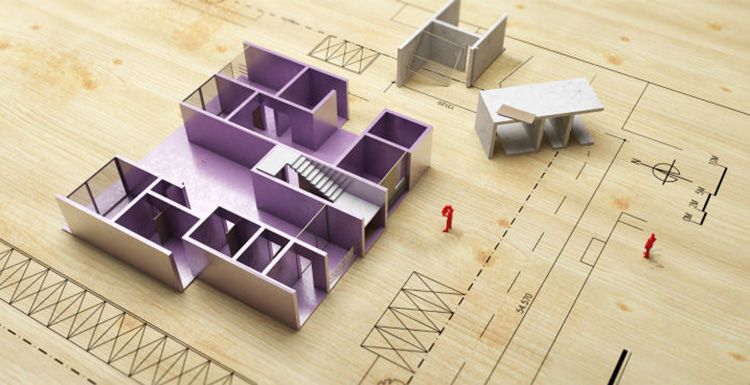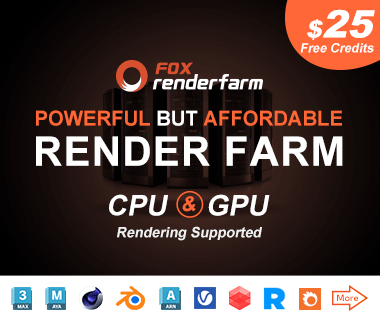Fox Renderfarm Blog

V-Ray 3.4 For Sketchup To Make A Work "Container Cabin"
V-Ray Rendering
The best cloud rendering services provider and GPU &x26; CPU render farm, Fox Renderfarm, will share with you a 3D tutorial of making container cabin with V-Ray 3.4 for SketchUp.A rendering exercise using V-Ray 3.4 for SketchUp, which uses the public model of the 3D Warehouse. The software used including SketchUp, V-Ray, Photoshop.1. PreparationAn existing model is used here, and the model is derived from the 3D Warehouse.The model has a high level of detail and can be used directly as an exercise. The position of the camera uses a lower angle to look up at the building.After choosing this angle, I began to think about what kind of effect I would end up with. In architecture and landscape design, there are many times when you need to further express your plan. After browsing through many excellent renderings, we will find that rendering performance requires artistic effects, and this performance is related to architectural photography and aesthetics.In this work, I observed this angle and felt that the day view was too dull, so I conceived a picture of the evening, and the energy radiated from the back of the building. Then start the arrangement.2. ModelFirst of all, in order to add reflection trees to the glass, I copied a batch of trees to the front of the building.Then in the building, some furniture models were added to add detail.3. MaterialAfter the model is finished, it will start to be rendered.In terms of material, the structural part of the building is mainly black steel, which is the general metal making parameter. However, in order to pursue the details, it also benefits from the new material property layer. I added a rust map to the metal as a mask to make the metal more Details. (Reflect Gloss - Use Mix texture in Reflection Glossiness and use rust maps to make two gray masks.)The cement wall uses a higher resolution texture,White wall also uses a texture,Then start to illuminate the scene. In the process of lighting, it is not necessary to be too restrictive to the light. In many cases, it needs to be adjusted according to your own feelings.The light source of the entire scene is divided into three parts.The first is the dome lighting, which uses a cool-toned dusk HDR.The second is the V-Ray sphere light behind the building. The height of the sun is in line with the HDR sun height and the angle is very low.The third is the lighting in the building's interior, placed directly on top of the building, thanks to interactive rendering, constantly adjusting the intensity and color of the light source.Interactive rendering greatly facilitates the adjustment of the light. On the ground, I used the VFS grass directly, which is very easy to use, much faster than making grass.4.Rendering and post-productionI did not make too many adjustments and directly pulled up the plot parameters. And added Z channel, MID.First, camera raw adjusts the color level, then uses the mask to buckle out the sky, mixing two skyes. Then use the channel to select the background tree to lower the hue, give a curve, raise the shadow and then brush out some details of the dark part, then take a screenshot, then use camera raw to adjust the color gradation, hue contrast and so on. Finally, add light to the architectural lights, and add vignetting around.Fox Renderfarm hopes it will be of some help to you. It is well known that Fox Renderfarm is an excellent cloud rendering services provider in the CG world, so if you need to find a render farm, why not try Fox Renderfarm, which is offering a free $25 trial for new users? Thanks for reading!Article reference from 3D artist Han Shilin

V-Ray For Sketchup To Make A Rendering Imitate The Penda Style
v-ray for sketchup
This is a rendering that imitates the Penda style and is the first attempt to simulate a manual model with rendering. The style of Penda has always been very much liked and yearned by me. It is elegant and readable.The following reference picture shows an indoor project from Penda.The software used is SketchUp, V-Ray, Photoshop.Step 1: Create a modelFirstly, look at the material of the reference model, here is composed of four materials, the bottom of the board, the floor plan, the placed character model. There is a rough plan to do before you do it, such as material or floor plan.The original model used in SketchUp is now a work in the previous exercise, and the models on the side are scattered into random placements. Then there is the element in which to add the floor plan.You can make the found design material into a png format in Photoshop, and then use this png into SketchUp to adjust it to the appropriate size. Place it on top of the board as follows,Step 2: Material adjustmentThe choice of material is actually very important. The color of the wood is dark and the color of the metal will affect the final rendering. Then you need to adjust the reflection, roughness, and reflection values of the material.During the adjustment, the board uses very weak reflections and roughness. If it needs to be more realistic, you can add a embossed iron map to increase the detail of the wood grain. The character model used for decoration needs to pay attention to the subdivision and simulate the feeling of smooth plastic. And the focus is on the texture of the metal model, because the Penda's picture has a feeling of powder, so the metal is pink and purple, and Glossiness is connected to the gray map.Step 3: Lighting and renderingThis part chose V-Ray to make lighting, and chose to turn off the skylight, and then played a large light source on the top of the model to simulate the light source, the color is white by default, and the subdivision is increased.Then adjust the AO layer, the picture is as follows:Step 4: Photoshop late adjustmentFirst copy a layer in soft light mode, the texture looks increased, and then adjust the contrast. And adding some dirt will make the model look more realistic. Finally, the periphery is blurred, the focus is simulated, and the final product is finished.Although the final result is still far from the style of Penda, the overall process of rendering is the same.
Recommended reading
Top 9 Best And Free Blender Render Farms of 2025
2024-12-30
Revealing the Techniques Behind the Production of Jibaro "Love, Death & Robots", Which Took Two Years to Draw the Storyboard
2025-02-10
Top 10 Free And Best Cloud Rendering Services in 2025
2025-03-03
Top 8 After Effects Render Farm Recommended of 2025
2025-02-10
Top 5 Best and Free 3d Rendering Software 2025
2025-02-10
Shocked! The Secret Behind Using 3D to Make 2D Animation was Revealed!
2025-02-10
How to Render High-quality Images in Blender
2024-12-04
Easy Cel Shading Tutorial for Cartoon in Blender Within 2 Minutes
2025-02-10
Partners



